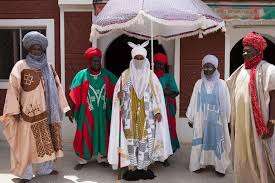- Class: Primary 1
- Term: 3rd Term
- Week: 7
- Age: 6 years
- Duration: 40 minutes
- Date:
- Subject: History
- Curriculum Theme: History
- Topic: Traditional Rulers
- Content:Meaning of Traditional Rulers, Titles and Names
Specific Objectives:
- Cognitive domain: Pupils will be able to explain the meaning of traditional rulers.
- Affective domain: Pupils will show respect towards the roles and titles of traditional rulers.
- Psychomotor domain: Pupils will be able to list two titles and names of traditional rulers.
- Social Domain: Pupils will understand the social activities and responsibilities of traditional rulers in their communities.
Reference Materials:
- 9 – Years Basic Education Curriculum
- Abuja Educational Resource Centre Scheme of work
- NAPPS National Unified Scheme of Work
- Online Information
- Textbooks
Instructional Materials:
- Pictures of traditional rulers
- Flashcards with titles and names of traditional rulers
- Map of Nigeria showing different kingdoms and their rulers
- Videos of traditional ceremonies
Rationale for the Lesson:
This lesson is important for understanding the cultural heritage and the role of traditional rulers in our society. It helps pupils appreciate the diversity and significance of leadership roles in different communities.
Prerequisite/Previous Knowledge:
Pupils are expected to have basic understanding of community leaders.
INSTRUCTIONAL PROCEDURES:
Content Development: Traditional Rulers
| Content | Time | Teaching Method | Teaching Strategy | Teacher’s Activity | Pupils’ Activity | Learning Point |
|---|---|---|---|---|---|---|
| Step 1: Introduction | 5 min | Discussion | Question and Answer | Introduce the topic and ask pupils about community leaders they know. | Respond to questions. | Understanding the concept of leadership. |
| Step 2: Meaning Of Traditional Rulers | 10 min | Lecture | Explanation | Explain the meaning of traditional rulers and their roles. | Listen and ask questions. | Meaning and roles of traditional rulers. |
| Step 3: Titles and Names | 10 min | Demonstration | Showing and Telling | Show pictures and flashcards of traditional rulers and their titles. | Identify and repeat titles. | Recognizing titles and names of rulers. |
| Step 4: Social Activities | 10 min | Interactive Learning | Group Discussion | Discuss the social activities and responsibilities of traditional rulers. | Participate in discussions. | Social responsibilities of traditional rulers. |
| Step 5: Note Taking | 2 min | Writing | Dictation | Dictate notes for pupils to write in their notebooks. | Write down notes. | Key facts about traditional rulers. |
| Step 6: Evaluation | 2 min | Oral Questions | Recap | Ask questions based on the lesson objectives. | Answer questions orally. | Assessing understanding of the lesson. |
| Step 7: Conclusion | 1 min | Summary | Reinforcement | Summarize the lesson, emphasizing the importance of traditional rulers. | Listen and understand the summary. | Reinforcing the lesson’s key points. |
Classroom Note:
Meaning of Traditional Rulers
Traditional rulers are leaders who inherit their position through family lineage and have authority over a specific area in a community or country. They play important roles in cultural, spiritual, and social activities within their communities.
Titles and names of traditional Rulers in Nigeria
- Oba of Lagos – Oba Rilwan Akiolu
- Emir of Kano – Aminu Ado Bayero
- Ooni of Ife – Oba Adeyeye Enitan Ogunwusi
- Sultan of Sokoto – Sultan Muhammadu Sa’ad Abubakar
- Obi of Onitsha – Igwe Nnaemeka Achebe
Evaluation Questions:
- What is the meaning of a traditional ruler?
- Can you list two titles of traditional rulers and their names?
- What are some of the responsibilities of traditional rulers in their communities?
Note to Teachers:
Ensure that the lesson content, teaching methods, and pupil activities are tailored to fit your teaching style, the curriculum, and the resources available. Utilize interactive teaching strategies to engage pupils and enhance their understanding of the topic. Encourage pupils to respect and appreciate the roles of traditional rulers in society.






